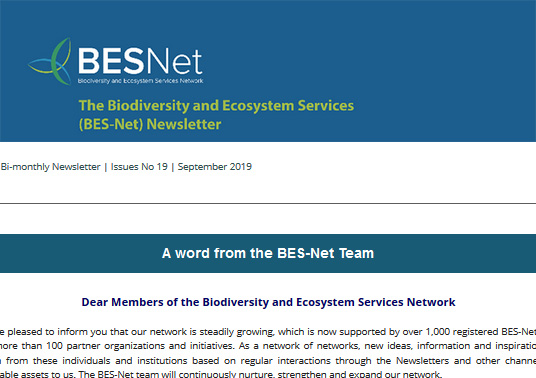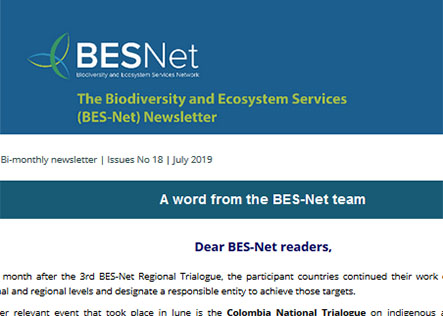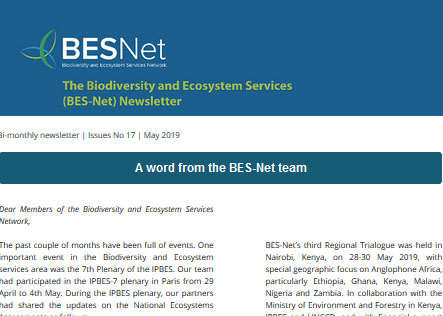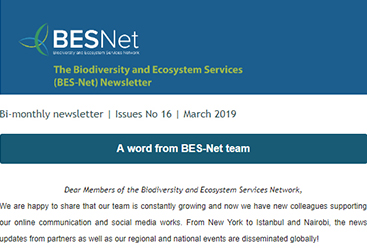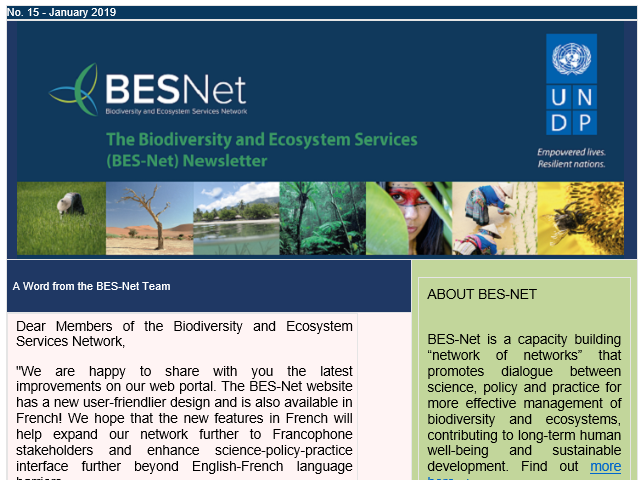Dear BES-Net Partners and Members

As we enter the final quarter of 2021, we see a shift in momentum in the arena of biodiversity conservation and ecosystem services. A slew of high-level events, driving commitment for action, stand as golden opportunities before us to shape the discourse around conservation in the time of the coronavirus pandemic. The UN Biodiversity Conference (CBD COP15) will take on a virtual form this year in October, with a hybrid meeting scheduled in Kunming, China, in 2022. This follows the UN Food Systems Summit, the IUCN World Conservation Congress (WCC), the 76th Session of the UN General Assembly (UNGA 76) and more, while setting the stage for more nuanced discussions at the UNFCCC COP26. The interconnectedness of rapid biodiversity loss and unprecedented climate impacts cannot be ignored any longer.
Yet while these larger global summits serve to mobilize international support and collaboration, matching these with strong evidence-based decision-making and capacity to implement is crucial at the national and subnational levels. Here at BES-Net, we’re working steadily with UNDP, UNEP-WCMC and UNESCO for the rest of the year to emphasize precisely this. After a successful launch of the National Ecosystem Assessment (NEA) in Colombia earlier this year, this crucial evidence now moves to the hands of policymakers and practitioners to make the best use of it. Later in the year and in 2022, we will see Cameroon, Ethiopia and Viet Nam join Colombia in launching their own NEAs. There is a wealth of experience that other countries embarking on their NEAs can rely on to build national evidence. Alongside this, BES-Net has been engaging stakeholders including policymakers and practitioners through the trialogic dialogue, or Trialogue, process in Kenya and Ethiopia during this time. Helping countries champion some of the recommendations arising from the NEAs and the Trialogues are the BES Solution Fund catalytic support that began implementation in Kazakhstan, Trinidad and Tobago and Nigeria.
During these last two months, we also welcomed two new partners into the fold – HiveTracks and YESS. Keen to join BES-Net’s coalition of partners? Please reach out to us at alexandra.postrigan@undp.org and prashanthi.subramaniam@undp.org! Interested in learning more about our BES-Net partners? Take a look at our new Partner of the Month series and don’t hesitate to reach out to us for more information or for being connected with BES-Net partners!
|
|
Marine Biodiversity- all at sea or not?

As a predominantly terrestrial species, we sometimes forget how dependent we are on the 70% of the Earth that is wet. Yet almost a billion people are highly dependent upon marine and coastal resources for their livelihoods, whilst we are currently using the majority of marine and coastal ecosystems in an unsustainable manner.
In 1995, fisheries scientist Daniel Pauly coined the term “shifting baseline syndrome” to reflect the tendency of each generation to accept what they see as the norm – failing to register the increasing depletion of marine resources, and biodiversity in general, around the world.
Careful historical reconstructions have revealed that marine ecosystems prior to the industrial revolution were more abundant than today. This opens up the opportunity, through appropriate conservation and restoration measures, to both “have our (fish) cake and eat it” (see figure). Evidence shows that marine ecosystem recovery through the establishment of protected areas is accumulating – see, for example, a recent study of the Lyme Bay Marine Protected Area in the UK, where a little over 10 years’ (partial) protection has resulted in a 400% increase in fish species richness and abundance.
At the recently concluded IUCN World Conservation Congress in Marseille, France, the “30 by 30” motion – a call for increases in both terrestrial and marine protected areas – to be considered for inclusion in the post-2020 Global Biodiversity Framework (Target 3) was endorsed.
Any large and rapid increase in marine protected areas will require much improved documentation and monitoring of marine biodiversity. Recent “close-up” and remote techniques have the potential to dramatically increase the knowledge base for management. Monitoring biodiversity using environmental DNA (eDNA) has advanced enormously over the past decade. Recently, Mediterranean ferries have been used to monitor marine vertebrate biodiversity with a proposal to scale up to all marine commercial traffic, whilst remote-sensed satellite imagery and artificial intelligence is being used to compile a high-resolution map of the world’s coral reefs.
All this data can feed into a newly published MPA Guide, which provides a dynamic framework for monitoring the progress of marine protected areas from proposal to full active management, thereby mitigating the danger of (wet) “paper parks”.
Armed with these new tools and techniques, it is still possible to restore the oceans to a condition that serves both biodiversity and humanity.
|
|
|
UN Biodiversity Lab launched to access state-of-the-art spatial data for conservation
|
|

UNDP and partners are launching UN Biodiversity Lab (UNBL) 2.0 to enable governments and other stakeholders to access state-of-the-art spatial data to generate insight for conservation and sustainable development.
UNBL 2.0 is freely available online in English, French, Portuguese, Russian and Spanish as a digital public good. The redesign offers modern web app design and enhanced functionalities based on user feedback. Users can now visualize over 400 of the world’s best available global spatial data layers; create secure workplaces to analyze data; access curated data collections to generate insight for action; and more.
Get involved – join the official launch on 4 October at 1 pm EDT (GMT-4) during Day 1 of the Nature for Life Hub!
|
|
|
Digital beekeeping assistant helps women beekeepers in Uzbekistan

A beekeeper practices a hive inspection using the Beekeeper’s Companion App, currently being piloted in Uzbekistan. (Photo credit: Farida Kuldasheva).
Thanks to funding from the German Federal Foreign Office, HiveTracks and ICARDA have co-designed a digital beekeeping assistant for women beekeepers in Uzbekistan. After six months of beekeeper interviews and feedback, the app’s beta version was recently tested during workshops in Bukhara and Tashkent. The beekeepers’ feedback will be integrated into the app’s next release ahead of the final project workshop and public launch.
|
|
Creating safe havens for vultures

Vultures are crucial elements of ecosystems around the world. When we protect vultures, we protect ourselves too. On the occasion of the International Vulture Awareness Day, celebrated on the first Saturday of September, the Bio-Bridge Initiative (BBI) presented how Endangered Wildlife Trust, BirdLife Zimbabwe, BirdLife Botswana and Raptors Botswana are collaborating to establish the first transboundary vulture-safe zone in southern Africa. Together, these organizations are acting for nature, for vultures and for us all. Read the full story here.
|
|
South Africa’s fungal diversity adds 7 new species to science

The aim of the project was to recover as many strains as possible from the collections and re-identify them using modern DNA sequencing approaches to obtain baseline knowledge on the diversity of Aspergillus in the country. In the table below are the other new Aspergillus species:
(i) Aspergillus elsenbergensis sp. nov. – named after Elsenburg College in the Western Cape where the ex-type was collected.
(ii) Aspergillus krugeri sp.nov. – named after the Kruger National Park where the ex-type was collected.
(iii) Aspergillus Magaliesburgensis sp.nov. – named after the town.
(iv) Aspergillus purpureocrustaceus sp. nov. – named with reference to the colonies on growth plates that turn purple and crust-like with age.
(v) Aspergillus seifertii sp. nov. – named after mycologist Dr Keith A Seifert.
(vi) Aspergillus sigurros sp. nov. – named after the music group Sigurros.
(vii) Aspergillus heldtiae sp. nov. – named after Margaret Vinci Heldt, the creator of the beehive hairstyle.
For more enquiries, contact Prof. Cobus Visagie at the University of Pretoria’s Forestry and Agricultural Biotechnology Institute at cobus.visagie@up.ac.za .
|
|
|
PANORAMA at the IUCN World Conservation Congress
 PANORAMA
PANORAMA recently attended the IUCN WCC held in Marseille on 3–11 September 2021. Hosting a number of events, including knowledge sharing sessions, demonstration clinics, virtual cafe and technical sessions, PANORAMA showcased its value-add as a platform to collate and share cutting-edge nature-based solutions. Among the many highlights of the event there was the signing of a continued collaboration agreement between GIZ and IUCN. Read more about all our activities during the congress here: https://panorama.solutions/en/news/panorama-iucn-world-conservation-congress |
|
|
UNESCO leads ILK training workshop for countries undertaking NEAs with UNEP-WCMC

On 22 September 2021, UNESCO conducted an indigenous and local knowledge (ILK) training workshop for Tranche III countries (the Dominican Republic, Malawi and Thailand) and Tranche II countries (Azerbaijan, Bosnia and Herzegovina, Cambodia and Grenada) of the NEA Initiative to introduce approaches and methodologies of working with ILK in NEA. Working with UNEP-WCMC, under the BES-Net project, the training brought together some 50 participants exploring ways to engage with indigenous and local practitioners in the NEA process at the scoping stage and evaluation stage. UNESCO has been leading the development of guidance documents on integrating ILK in the NEA process, and these tools were shared with NEA teams. |
|
|
6th European Conference of Conservation Biology tackles biodiversity in a changing world
The Society for Conservation Biology – Europe Section will organise the 6th ECCB in Prague on 22–26 August 2022. The theme of the meeting is “Biodiversity crisis in a changing world”. The current biodiversity crisis has led to a call for transformative change globally and in Europe. This call challenges how we perform conservation science and calls for science-based practices that put humans and nature on a path that takes us out of the current crisis. ECCB expects practitioners, consultants, policymakers, conservation and social scientists and students in a large number to meet and discuss the state-of-the-art conservation science, practices and future challenges. To stay updated with the agenda and event, visit https://www.eccb2022.eu/.
|
|
|
Promoting the culture of mushrooms in technical agriculture schools in DRC

In the past, several Belgian development actors have promoted research on the domestication of wild mushrooms and the development of business models to cultivate them. Capitalizing on this, CEBioS, together with VVOB (a Belgian NGO specialising in educational programmes) and in close cooperation with the National Ministry of Education, is setting out to introduce the mushroom culture in technical agricultural schools in the Kongo central province. Teachers, students, NGOs and others are trained to set up, manage their own mushroom crops and develop business plans tailored to their local economic environment or school curriculum. Training and manuals have been developed by scientists of the Universities of Kinshasa, Kisangani and Bukavu.
|
|
|
Sub-Global Assessment Network (SGAN) connects actors in ecosystem assessments

In 2007, UNEP, in collaboration with a consortium of partners, convened SGAN to provide ongoing support to sub-global assessments catalyzed during the course of the Millennium Ecosystem Assessment or in its follow-up. From August 2021, UNEP-WCMC, in collaboration with the NEA Initiative, reconvened members of SGAN and welcomes new partners to the network with the intention of strengthening the activities of the network by:
(i) Supporting national ecosystem assessments (two webinars were held in September 2021: “Tailoring the IPBES methodology for national ecosystem assessments” and “Intended uses and expected impacts of the national ecosystem assessments” to enhance capacity for uptake of the NEA by countries)
(ii) Encouraging and fostering knowledge-sharing between and amongst sub-global assessments
(iii) Providing opportunities for training
Are you involved in sub-global assessment or would like to learn more about the process? Join the network and stay up to date with upcoming events
|
|
|
CEBioS participates at the Science Summit at UNGA76
Luc Janssens de Bisthoven was a speaker at the Science Summit of the UNGA76. His presentation, where he promoted CEBioS and EVAMAB as useful instruments for supporting the SDGs in developing countries, took place on September 21. The Science Summit at UNGA76 will be a major contribution to advancing Science for the UN SDGs. The event is being held in New York on 14–30 September 2021, but you can also participate online (for free). |
|
|
Call for external review
The external review of the draft nature futures framework and methodological guidance is open until 31 October 2021. The aim of this review is to ensure the highest scientific quality and policy relevance of the draft nature futures framework and methodological guidance by engaging governments and stakeholders. As part of the review, IPBES will organize two online dialogue workshops, one for IPBES national focal points and the second open to all stakeholders. For more information, visit here. |
|
|
Call for nominations for IPBES Committee on Conflicts of Interest from Asia-Pacific group
A call for nominations for the IPBES Committee on Conflicts of Interest from the AsiaPacific Group is underway. IPBES members from the Asia-Pacific region are invited to submit nominations by 30 September 2021. Nominations should be made by completing the form here, including the submission of a curriculum vitae of the nominee. Early nominations ahead of the deadline are encouraged. For more information, please visit here.
|
|
|
Save the Date: IPBES-9 Plenary Session
The IPBES secretariat recently announced that the 9th session of the IPBES Plenary (IPBES 9) will be held from 3 to 9 July 2022 in Bonn, Germany. Among other things, the Plenary will consider the thematic assessment of the sustainable use of wild species, the methodological assessment regarding the diverse conceptualization of multiple values of nature and its benefits, including biodiversity and ecosystem functions and services, and the scoping report for a methodological assessment of the impact and dependence of business on biodiversity and nature’s contributions to people. Prior to the Plenary, regional consultations and stakeholder days will be hosted. For more information, please visit here.
|
|
Partner of the Month series promotes and disseminates best practices, success stories and other relevant news from the Network with the overarching intention to shed light on progress in biodiversity and ecosystem services. To learn more about and get involved in this initiative, please contact alexandra.postrigan@undp.org
|
|
 |
| NATURE PLURIELLE, BENIN |
|
|
Take action for people and the planet: All Hands on Deck media challenge by UNEP
28 September- 12 October, 2021
The All Hands on Deck media challenge, taking place from 28 September to 12 October, aims to show that youth around the world understand what it means to live more sustainably and take positive climate and biodiversity action! The challenge works as part of UNEP’s Anatomy of Action and engages organizations and networks involved in climate, nature, youth, education and sustainable development to galvanize one effective voice of change and to create an aspirational mosaic of what sustainable living already looks like. UNEP’s Sustainable Lifestyles team supports partners, aggregates results and helps feed messaging into key (policy) events. As of July 2021, the challenge has reached 9.4 million people and is going strong! The challenge builds momentum towards the 50th UNEP anniversary and Stockholm+50 in 2022. Read more about it here. |
|
|
UN Food Systems Summit builds commitment for greener, healthier food systems
23-24 September, 2021
The UN Food Systems Summit was announced by the UN Secretary-General, Antonio Guterres, on World Food Day as a part of the Decade of Action for delivery on the SDGs by 2030, with the aim of moving the needle on all 17 SDGs through a food systems approach, responding to global challenges such as hunger, climate change, poverty and inequality. Held on 23 and 24 September virtually, the Summit marks the beginning of a series of international platforms and processes including the Pre-COP, the UN Biodiversity Conference and the UN General Assembly. The summit commitments emerge from policymakers, civil society, farmers, indigenous peoples, youth and solutions being shared about how to shift to greener, healthier and more equitable food systems that tackle waste, environmental damage and climate change impacts. Read more here. |
|
Sub-global Assessment Network celebrates reconvening of members
Click here to read all about it!
|
|
NEA Process Offers Veritable Lessons for Biodiversity and Ecosystem Policymaking: Click here to read all about it!
|
|
|
Programme Officer, Conserving Land and Seascaoes
Organization: UNEP-WCMC
Location: Cambridge, United Kingdom
Closing date: 8 Oct 2021
See here.
Agriculture Conservation Practitioner
Organization: The Nature Conservancy
Location: United States of America
Closing date: 8 October 2021
See here. |
|
|
|
